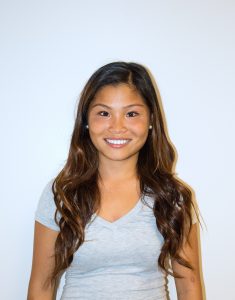 Pauline Chuang, BKin 2017, discovered her passion in the power of healing through rehabilitation – specifically through therapeutic exercises and manual therapy, in her undergraduate years. During her time at UBC, Pauline was highly involved in the UBC KIN community. She served as a Student Athletic Trainer for the UBC Women’s Rugby team, a Personal Trainer Supervisor and Group Fitness Facilitator at UBC BodyWorks, a Workshop Presenter at the Student Leadership Conference, and as VP Communications for the Kinesiology Undergraduate Society. Her enthusiasm for helping individuals to achieve their fitness goals soon spilled off campus where she worked in the Vancouver fitness and physiotherapy community. She volunteered at GF Strong Rehabilitation Centre and worked at Kids Physio Group, The ScoliClinic, and Kidsfirst Physio.
Pauline Chuang, BKin 2017, discovered her passion in the power of healing through rehabilitation – specifically through therapeutic exercises and manual therapy, in her undergraduate years. During her time at UBC, Pauline was highly involved in the UBC KIN community. She served as a Student Athletic Trainer for the UBC Women’s Rugby team, a Personal Trainer Supervisor and Group Fitness Facilitator at UBC BodyWorks, a Workshop Presenter at the Student Leadership Conference, and as VP Communications for the Kinesiology Undergraduate Society. Her enthusiasm for helping individuals to achieve their fitness goals soon spilled off campus where she worked in the Vancouver fitness and physiotherapy community. She volunteered at GF Strong Rehabilitation Centre and worked at Kids Physio Group, The ScoliClinic, and Kidsfirst Physio.
During her studies, Pauline successfully implemented a pilot project at the Pacifica Treatment Centre that explored the relationship of physical exercise and recreation in the recovery from substance abuse. The initiative was so successful that it quickly turned into a sponsored physical activity treatment program, assisting individuals in their recovery by contributing to both their physical and mental well-being. As a result of this project, Vancouver Parks Board now provides community centre gym passes for all persons in recovery.
Pauline’s wide range of work experiences fueled her growing curiosity about the human body’s profound ability to heal itself, and inspired her to further explore making her passion her career. Australia is renowned for its leading-edge physiotherapy research and practice, and so Pauline set out to Sydney, Australia to chase after her dream of becoming a physiotherapist.
She is now in her final year of her Master of Physiotherapy program at the University of Sydney and is working towards becoming a Pediatric Physiotherapist. She hopes to integrate a play-focused environment with evidence-based practice to help kids reach their developmental potential. Pauline’s goal is to lead the shift in the approach of rehabilitation from reactive care to proactive care.
